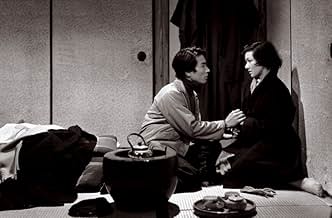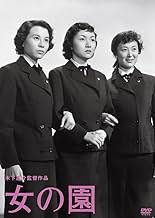A student at a woman's university takes a controversial action against the school's old-fashioned doctrines.A student at a woman's university takes a controversial action against the school's old-fashioned doctrines.A student at a woman's university takes a controversial action against the school's old-fashioned doctrines.
- Awards
- 8 wins & 1 nomination
- Director
- Writers
- All cast & crew
- Production, box office & more at IMDbPro
Storyline
Did you know
- TriviaHideyo Amamoto's film debut.
- Quotes
Tomiko Takioka: I have the right to reject what I dislike. You made it hard for me to go home. What did I do wrong? I'm no longer a child!
- ConnectionsFeatured in Century of Cinema: Nihon eiga no hyaku nen (1995)
Featured review
A moving story, but what makes the film special is its context. For something coming out of Japan in 1954, I was surprised to see the theme of student rebellion against the conservative administrators of an all-women college, the questioning of the limits placed on their role in society after they graduate, and the criticism of the control of the patriarchy.
In early scenes we see that the college is what you might call a 'finishing school,' one intent on instilling morality, conformity, and 'proper behavior' more than academic rigor or intellectual debate. In addition to the restrictions on dress and thought, one of the administrators (Mieko Takamine) also reads her students' private letters and uses a variety of techniques to humiliate them. In reaction to student complaints and calls for a more liberal environment, she responds by saying the students are being unduly influenced by outside agitators and communists (yes, that old conservative ploy, to claim the protest is being fomented by outsiders).
Without describing them all, there are a number of student characters, and I liked how their viewpoints and backgrounds were unique. The pressure on a young woman named Yoshie (Hideko Takamine) is greatest of all since it comes from multiple directions. She wants to do well so that she can work afterwards (as opposed to the majority who simply want to get married), but she's prevented by rigid regulations from staying up late to study. She's in love with Shimoda, a young man of modest means (Takahiro Tamura), but her father forbids her to continue seeing him, and he's assisted by the school which informs him of their letters. This idea of graduating from college, getting a job, and marrying for love is challenged to say the least, and in incredibly unfair ways.
I loved the variation in pacing from director Keisuko Kinoshita. In quiet, contemplative scenes he's slow, and lets dialog heavy with feeling work on the viewer. As action progresses, he moves things along with cuts and scene changes. My favorite scene was a tracking shot, where Yoshie and Shimoda are walking along and talking about life and their possible future together. The unfairness he perceives is from the older generation, and he says "After the surrender, politicians said the whole nation was responsible for the war. If we always have to share the responsibility, then we want to have a say in our own lives."
Later, we get a glimpse at the unfairness she perceives from a male-dominated society. She's mentioned that she can get a job to help support them, and he says "But as a man, it's my duty to support you." She responds simply by saying, "I don't understand. Why is it always about men?" Both lines expressing unfairness are brilliant, and all the more powerful for the simplicity of their delivery.
As they later part (and this is not their final meeting or a spoiler), there is another wonderful moment when she waves a handkerchief at him from the top of a castle tower, and he waves back from the back of the last car of a train riding away. It's quite touching, and I loved how this scene revealed so much about the depth of their feelings for one another.
There are other moments that may get a little too melodramatic, depending on your taste, but overall I thought the performances were all solid. The world was changing after the war, and the film has a kinship with rebel movies from other cultures. I give it four out of five stars for its story, plus an extra half star for the courage of the message and the treatment of women. I read that Kinoshita and Kurosawa were rivals of a sort, and while I revere Kurosawa, it's interesting to reflect that one of the (perhaps unfair) criticisms against him is his depiction of women. This film is in stark contrast to that, or to films with more conservative messages, such as some of Ozu's work.
In early scenes we see that the college is what you might call a 'finishing school,' one intent on instilling morality, conformity, and 'proper behavior' more than academic rigor or intellectual debate. In addition to the restrictions on dress and thought, one of the administrators (Mieko Takamine) also reads her students' private letters and uses a variety of techniques to humiliate them. In reaction to student complaints and calls for a more liberal environment, she responds by saying the students are being unduly influenced by outside agitators and communists (yes, that old conservative ploy, to claim the protest is being fomented by outsiders).
Without describing them all, there are a number of student characters, and I liked how their viewpoints and backgrounds were unique. The pressure on a young woman named Yoshie (Hideko Takamine) is greatest of all since it comes from multiple directions. She wants to do well so that she can work afterwards (as opposed to the majority who simply want to get married), but she's prevented by rigid regulations from staying up late to study. She's in love with Shimoda, a young man of modest means (Takahiro Tamura), but her father forbids her to continue seeing him, and he's assisted by the school which informs him of their letters. This idea of graduating from college, getting a job, and marrying for love is challenged to say the least, and in incredibly unfair ways.
I loved the variation in pacing from director Keisuko Kinoshita. In quiet, contemplative scenes he's slow, and lets dialog heavy with feeling work on the viewer. As action progresses, he moves things along with cuts and scene changes. My favorite scene was a tracking shot, where Yoshie and Shimoda are walking along and talking about life and their possible future together. The unfairness he perceives is from the older generation, and he says "After the surrender, politicians said the whole nation was responsible for the war. If we always have to share the responsibility, then we want to have a say in our own lives."
Later, we get a glimpse at the unfairness she perceives from a male-dominated society. She's mentioned that she can get a job to help support them, and he says "But as a man, it's my duty to support you." She responds simply by saying, "I don't understand. Why is it always about men?" Both lines expressing unfairness are brilliant, and all the more powerful for the simplicity of their delivery.
As they later part (and this is not their final meeting or a spoiler), there is another wonderful moment when she waves a handkerchief at him from the top of a castle tower, and he waves back from the back of the last car of a train riding away. It's quite touching, and I loved how this scene revealed so much about the depth of their feelings for one another.
There are other moments that may get a little too melodramatic, depending on your taste, but overall I thought the performances were all solid. The world was changing after the war, and the film has a kinship with rebel movies from other cultures. I give it four out of five stars for its story, plus an extra half star for the courage of the message and the treatment of women. I read that Kinoshita and Kurosawa were rivals of a sort, and while I revere Kurosawa, it's interesting to reflect that one of the (perhaps unfair) criticisms against him is his depiction of women. This film is in stark contrast to that, or to films with more conservative messages, such as some of Ozu's work.
- gbill-74877
- Mar 23, 2019
- Permalink
Details
- Release date
- Country of origin
- Language
- Also known as
- Devojački bunt
- Production company
- See more company credits at IMDbPro
- Runtime2 hours 21 minutes
- Color
- Sound mix
- Aspect ratio
- 1.37 : 1
Contribute to this page
Suggest an edit or add missing content

































